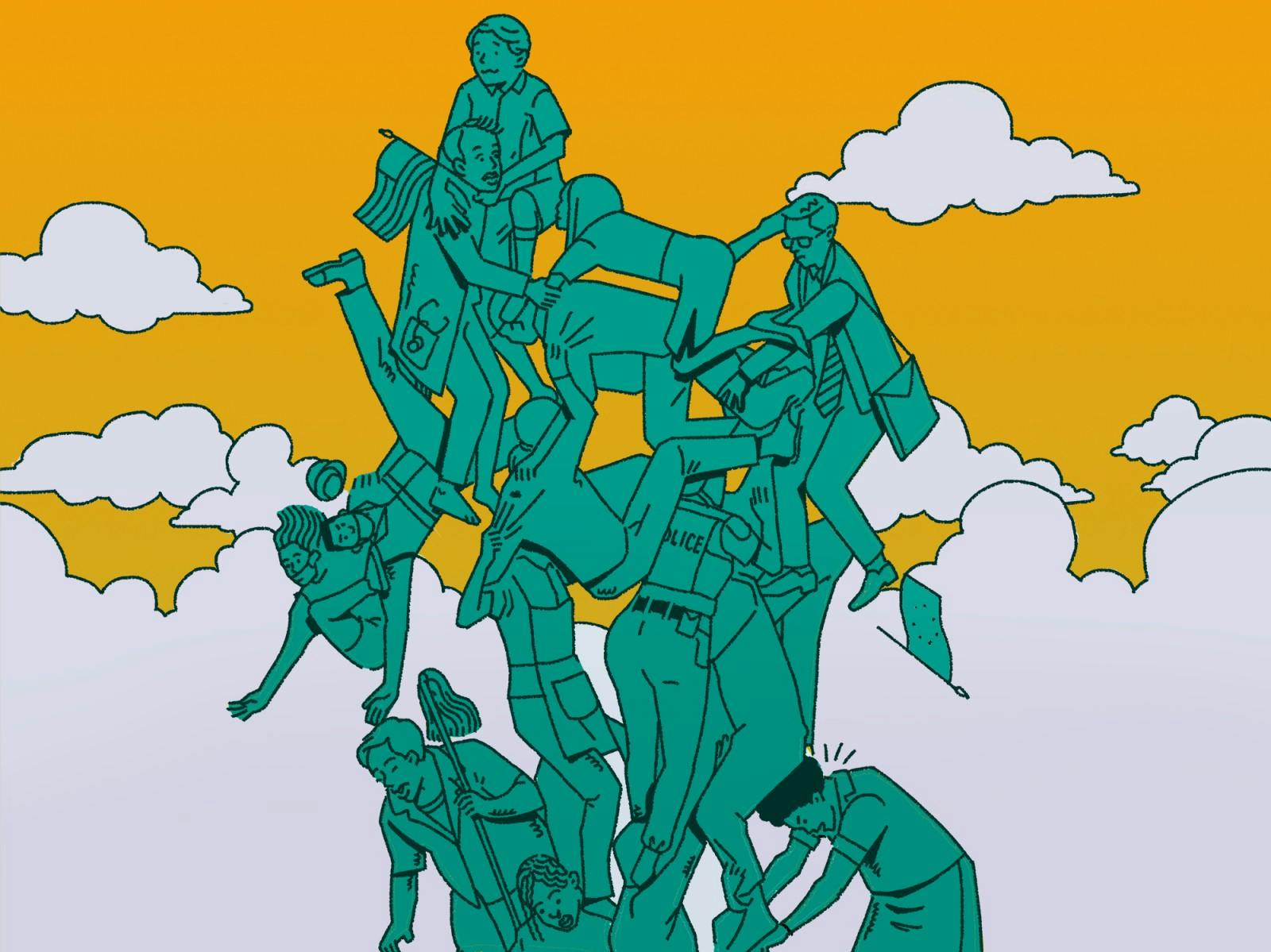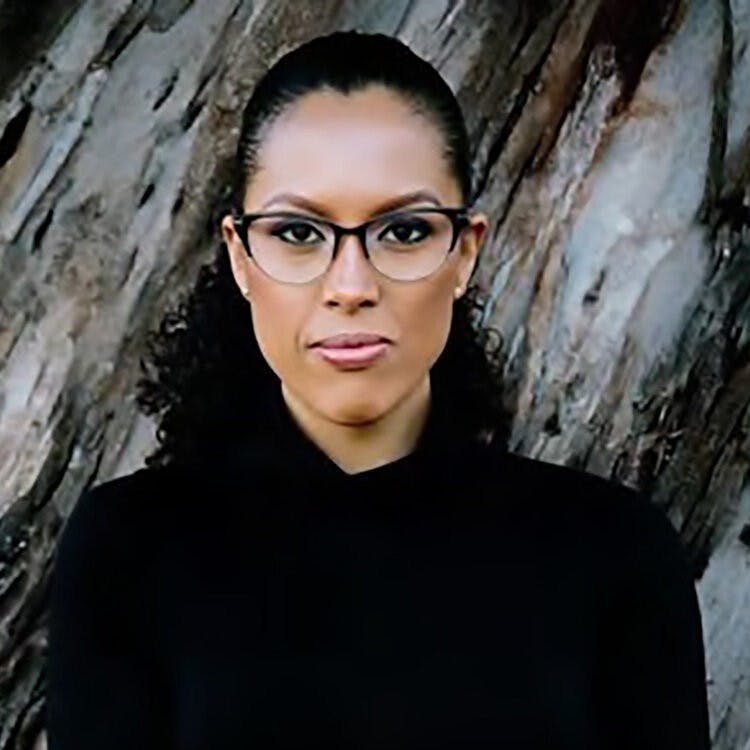Debt that Remains
African countries are thriving in 2040 after unilaterally withholding repayments, nearly two decades earlier, of debt that limited their abilities to respond to the Covid-19 pandemic. Alex Fitzgerald reflects on what remains to be done.

Illustration by Musonda Kabwe
The average teenage girl on the African continent today, in the year 2040, enjoys significantly better quality of life than her peers did two decades ago. She is more educated, wealthier, and lives in societies that, for the most, part respect her agency and bodily autonomy. Her life expectancy has improved, too, as has that of the rest of the continent’s populace. The mere fact of these transformations isn’t remarkable. What is, however, is their sheer pace and scale, which have seen a number of countries of the continent leapfrog others in Europe, North America, and parts of Asia that were considered further ahead on multiple indices of social wellbeing—including the Human Development Index and the Genuine Progress Indicator. Some countries, Mauritius, Nigeria, Ghana, Angola and South Africa among them, have even leapt ahead in terms of GDP, which, however unfortunately, continues to have outsize sway as a measure of social progress even if the consensus position now is that it is wholly inadequate for this purpose.
While there were multiple factors behind these outcomes, few in my view have had as profound an effect as the Lusaka Sovereign Debt Strike of 2023. So profound, in fact, that tales of the Strike have taken on mythical proportions and attracted impassioned debate about the extent of its successes and failures. After all, despite the improvements, African countries today are still heavily indebted. And while poverty has been nearly eliminated, inequality remains and has grown in some countries, fomenting the risk of social unrest.
But, a direct line can be drawn between the Strike and the important reforms to the architecture of global sovereign debt that came in the years that followed, which paved the way for the rapid transformations countries on the continent experienced in the last decade. The reforms, in particular the introduction of the universal public goods and services guarantee, saw to it that debtor nations no longer had to choose between servicing debt and allocating funds to essentials such as education, health, food, and shelter for their populations, as many had to during the covid-19 pandemic. The latter is now a given while the former is subordinated: sovereign debt agreements today, whether entered into with Bretton Woods institutions such as the International Monetary Fund and World Bank, other nations, or private lenders, come pre-packaged with the stipulation that public spending on basic, humanity-affirming goods and services will, without risk of penalty, take precedent over capital repayments and interest.
Other reforms, taken directly from the 2025 Kalanga Code for Good Sovereign Lending Practice, reintroduced capital controls and required that sovereign loans be ethical, equitable and denominated in the currency of the debtor country except in the most exceptional of circumstances; for example, if the debtor country is democratic, requests deviations from this new norm, and there are sound economic, fiscal and social reasons for it. As a result, lenders today are invested not merely for profit or to exert strategic, geopolitical control over would-be friends and foes; they find themselves in it for the long haul, whether feast or famine. Even I’ve been surprised at how well these investors, whether local or foreign, have behaved when returns are more tightly pegged to the fate of the country in which they’re investing.
Those familiar with my history might accuse me of bias or romanticising my past, a point I will set aside for now and respond to at the end. After all, as some might say, it was I in my capacity as head of research at the United Nations Economic Commission for Africa who commissioned and published an issue paper in June 2022 suggesting that, to fund their economic, social and public health responses to the covid-19 pandemic, African countries should consider unilaterally defaulting on any and all external debt whose service costs were taking much-needed resources away from their pandemic response measures. In most of the continent’s debt-distressed countries, the potential savings on repayments and interest were far in excess of any possible relief package international financial institutions had up to that stage offered. By some quirk of fate, the paper was picked up by the mainstream press—something that seldom happened with our research publications. UN Urges Africa To Default On Debt, the headlines read, making, to my horror, the entire UN system responsible for a paper I had produced. The attention was too much for the otherwise sedate UN body, which, after a hasty internal investigation, retracted the paper and terminated my employment contract.
But it was too late. Furious debates about the paper had spread from the headlines to op-eds, talk shows, and social media. Prominent figures, including a group of former central bank governors and former finance ministers, welcomed it as a much-needed contribution to the debate, while conservative think-tanks rubbished the paper’s ideas. It would seem in hindsight that the paper struck a nerve in both those for and against, even if I doubt that many read beyond the headlines. It was the idea that countries could, and should, simply walk away from stifling debt in times of social distress that seemed to appeal and horrify in equal measure.
It was the idea that countries could, and should, simply walk away from stifling debt in times of social distress that seemed to appeal and horrify in equal measure.
My unceremonious ouster from the commission also caught the attention of Wanda Kalanga, Angola’s first woman finance minister, who had been growing increasingly frustrated with the gulf between what was being said about the responses needed in light of the pandemic and what was being done. On the one hand, most people agreed that the pandemic revealed the true extent of the deep, longstanding vulnerabilities of African economies, public finances and societies to exogenous shocks—the result of colonialism, extractive global capitalism, and political mismanagement. They agreed, too, that it called for swift, bold action that would not only help these countries respond to and recover from the effects of the pandemic but also produce the systemic and structural changes needed to ensure that, when the next pandemic or other shock came around, African countries wouldn’t once again be left scrambling for resources to protect and help their populations. But, on the other hand, little was being done and there seemed to exist a paucity of ideas that were both bold and sound. Kalanga wanted to close the gulf and recruited me as her advisor.
In November 2022, as I was settling into my new role, a fifth wave of the pandemic began sweeping across the continent. By then, national debt in Africa had risen to new, record-breaking levels, most well above accepted benchmarks. National budgets were tapped out, too. The new wave prompted thirty-six African finance ministers including Kalanga, supported by my former bosses at the commission, to issue a joint call to G20 countries for substantial and meaningful reprieve on interest payments and that looming capital repayments be pushed back until after the pandemic was under control. The ministers were not asking for their countries to be released from the obligation to pay. All they wanted was a long-term moratorium that would allow them to redirect what limited resources they had to protecting lives and livelihoods as it had become clear that the pandemic would persist for at least two years more. What they were offered instead was a one-year extension to sovereign debt-relief measures introduced at the onset of the pandemic; measures that did not cover debt owed to private lenders and multilateral institutions, which was significant in several African countries’ books.
It was at this moment that unilateral sovereign debt default, an idea that had only months earlier cost me my old job, returned to the public domain, this time triggered by its inclusion in the economic policies of at least two large political parties, one in Zambia and the other in The Gambia. Other political parties across the continent were warming to the idea, too, prompting incumbents to think carefully on what had quickly become a lightning-rod issue. And as the fifth wave raged, Zambia became the first to actually default, having taken on external foreign-currency debt in recent years that the country was always going to struggle to service and repay even under the best of circumstances. Onlookers let out a collective gasp, but then when the default did not significantly worsen Zambia’s already dire economic fortunes, other countries burdened by high levels of external debt began hinting that they might default, too, if their pleas for meaningful reprieve were ignored in the way that Zambia’s were.
Few lenders took these warnings seriously, however, even as Kalanga and I met with South Africa’s central bank governor and finance minister to urge them to take the pleas of fellow African countries to the G20 summit in October 2022. But, like their G20 peers, South Africa brushed off Zambia’s default as an anomaly, the result of racking up large amounts of debt from private lenders in a short amount of time while failing to spend the funds in ways that would rapidly grow the country’s productive capacities. They diminished the role of profit-motivated lenders in the country’s sovereign debt crises.
G20 countries also underestimated how politically charged the issue had become. They did not anticipate what came next in the months after the G20 summit, as one African country at the brink of debt distress after the other announced that they would be redirecting scheduled repayments and interest costs on all external debt denominated in foreign currencies to fund their pandemic response. And by February 2023, when Ghana, Kenya and Ethiopia followed Mozambique, Congo Republic, Gambia, Mauritania, Burundi, Djibouti and Cape Verde in joining Zambia in what the media had dubbed a debt strike, it became clear that there was more at stake than debt relief. The seeming imperviousness of wealthier nations and Bretton Woods institutions to pleas by these African countries became a pulpit for airing longstanding grievances. It also had the unexpected consequences of piquing the interest of other debt-burdened nations of the world, raising the spectre of a global debt strike.
Angola did not join the Strike, however. It was for strategic reasons. Kalanga foresaw the need for an intermediary to negotiate an equitable end to the stand-off, which threatened to destabilise the global financial system and plunge the lives of people dependent on public services into further uncertainty. In addition to securing three years of more robust and all-encompassing relief for debt-burdened countries, Kalanga’s mediation efforts also resulted in the establishment of an inquiry led by representatives from government, business, workers and civil society across the continent to investigate the issue of Africa’s sovereign debt and propose concrete solutions. Thus, the Kalanga High-Level Panel on Africa’s Sovereign Debt was born, a joint initiative of the African Union and UN Economic Commission for Africa, with the support of Bretton Woods institutions and the G20, and with myself as the head of the secretariat.
On the earlier question of my role in these historical events and if I’m overstating the impact of the Strike to cast myself in a better light amid accusations that Kalanga sold out the global anti-debt movement to a clique of global and local elites, I can only shrug. It’s impossible for me to sit here today and imagine what would have happened had she not pushed for negotiations. It’s impossible to say what would have happened had there not been compromise. Perhaps the Kalanga Code did not go far enough in pushing for all the demands that emerged from the Strike. But it could also be argued that the Code’s ten recommendations were all that were possible at the time. I also find myself swayed by today’s calls for the abolition of sovereign debt as a step towards decommodifying our economies and societies, delinking human progress from growth and capital accumulation, and eliminating the unjust class system. If anything, perhaps the great lesson from the Strike is that it was only when pushed into a corner that debt-burdened African countries finally took a united, decisive stance on the issue. So, the question today’s generation of anti-debt activists must reckon with is how to build that kind of consensus without waiting and hoping for a crisis to strike.

